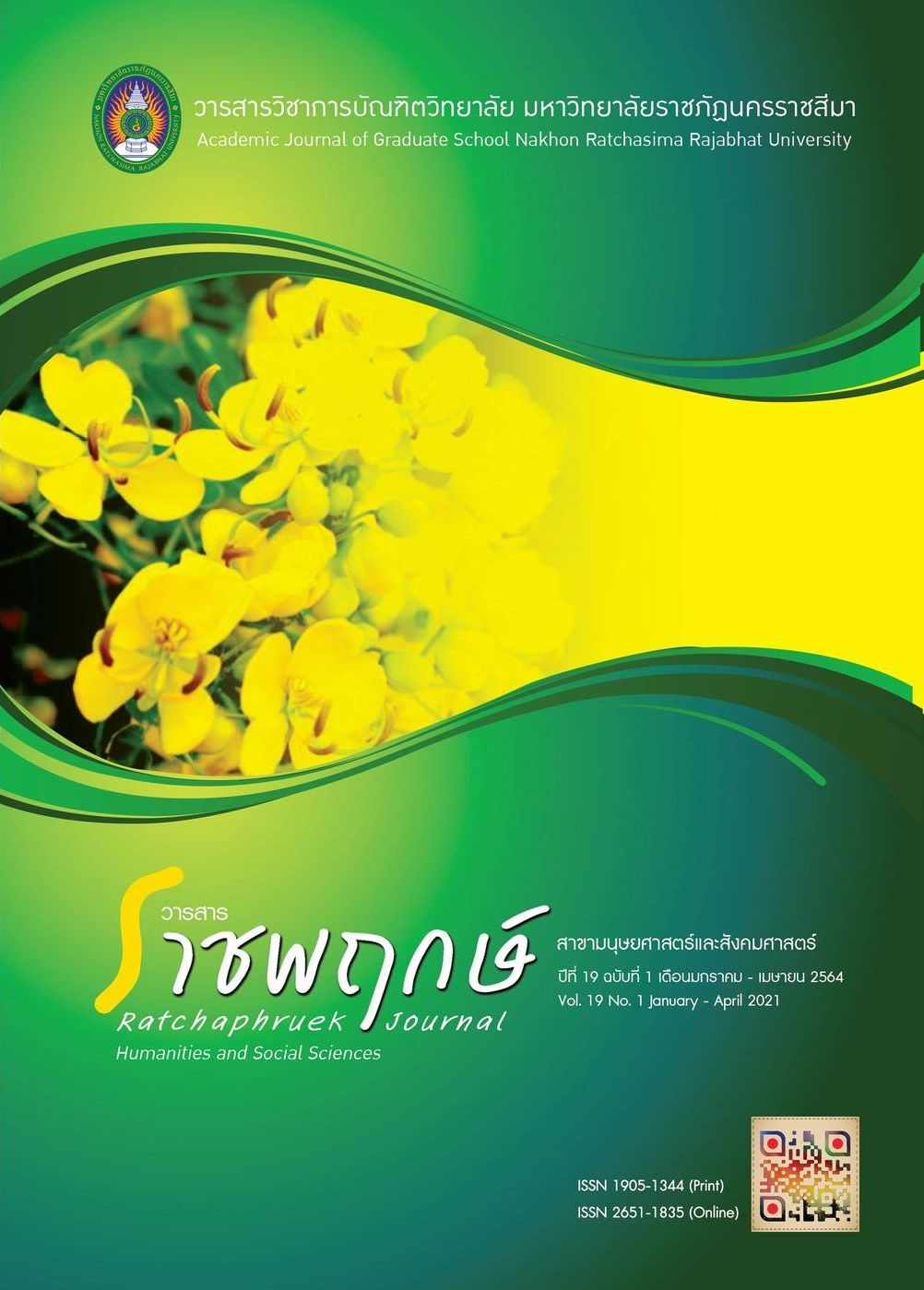A Development of English for Local Tourism Instructional Model in Nakhon Ratchasima Province
Main Article Content
Abstract
An English for local tourism instructional model in Nakhon Ratchasima province was developed to enhance students’ English oral communication ability using a research and development methodology. The purposes of this research were; 1) to develop an English for local tourism instructional model in Nakhon
Ratchasima Province, and 2) to evaluate the quality of the developed instructional model. The research procedure was divided into 3 phases: 1) develop the English for local tourism instructional model in Nakhon Ratchasima Province; 2) construct the research instruments, and 3) evaluate the quality of the developed instructional model by implementing it with 36-undergraduate students who were enrolled in English for local tourism in the first semester of the academic year 2018 at Nakhon Ratchasima Rajabhat University. The samples were selected using cluster random sampling. The research instruments were the oral communication ability test, local attraction knowledge test, and learner’s log. The data were analyzed using a t-test. The findings of this study were: 1) The teaching stages of English for the local tourism instructional model were: Orientation, Preparation, Information gathering, Project presentation, and Wrap-up,and 2) The evaluation of the English for local tourism instructional model revealed that after taking the developed instructional model, the post-test mean scores of the students’ English oral communication ability and their local attraction knowledge were significantly higher than their pre-test ones at the level of .05. The developed instructional model could improve students’ English oral communication ability and their local attraction knowledge. The research results can be applied to create other instructional models, lessons, and learning procedures in the tourism context.
Article Details
References
ทิศนา แขมมณี. (2552). ศาสตร์การสอน. (พิมพ์ครั้งที่ 11). กรุงเทพมหานคร : สำนักพิมพ์แห่งจุฬาลงกรณ์มหาวิทยาลัย.
Ellis, R. (2004). Task-based language learning and teaching. China: Oxford University Press.
Epstein, R., and Ormiston, M. (2007). Tools and Tips for using ELT materials: A guide for teachers. Ann Arbor, Michigan: University of Michigan.
Freid-Booth, D. L. (1997). Project work. (8th ed.). Oxford: Oxford University Press.
Joyce, B., Weil, M., and Calhoun, E. (2011). Models of teaching. 8th ed. Boston: Pearson Prentice Hall.
Kuosuwan, B. (2016). The readiness of English communication skills of tourism employees in Bangkok for entering the ASEAN Community. International Journal of Environmental & Science Education. 11(18): 12903-12907.
Nunan, D. (2004). Task-based language teaching. Cambridge: Cambridge University Press.
Oller, J. W. (1979). Language testing at school: a pragmatic approach. London: Longman.
Prabhu, N. S. (1987). Second language pedagogy. New York: Oxford University Press.
Prachanant, N. (2012). Needs analysis on English language use in tourism industry. In The 8th International Language for Specific Purposes (LSP) Seminar – Aligning Theoretical Knowledge with Professional Practice. Procedia - Social and Behavioral Sciences. (66) 7 December 2012, pp. 117-125. Retrieved December 15, 2017, from DOI: 10.1016/j.sbspro.2012.11.253
Richards, J. C., and Rodgers, T. S. (2014). Approached and methods in language teaching. (3rd ed.). Cambridge: Cambridge University Press.
Sanguanngarm, N. (2010). A development of the English tourist guides course using a task-based approach to enhance the oral English communication ability of Chiang Mai Rajabhat University Undergraduates. (Doctoral dissertation, Chulalongkorn University).
Siritararatn, N. (2007). A development of the English oral communication course using the project-based learning approach to enhance English oral
communication ability of Kasetsart University students. (Doctoral dissertation, Chulalongkorn University).
Stoller, F. L. (2010). Promoting purposeful language learning with project work. Tokyo: The Institute of English Language Education, Rikkyo University.
Sunanratn, T. (2013). A development of English oral communication for marketing course based on the project-based learning approach to
enhance undergraduate students’ oral communication abilities and social skills. (Doctoral dissertation, Chulalongkorn University).
Willis, J. (2000). A framework for task-based learning. Oxford: Longman Handbook.


